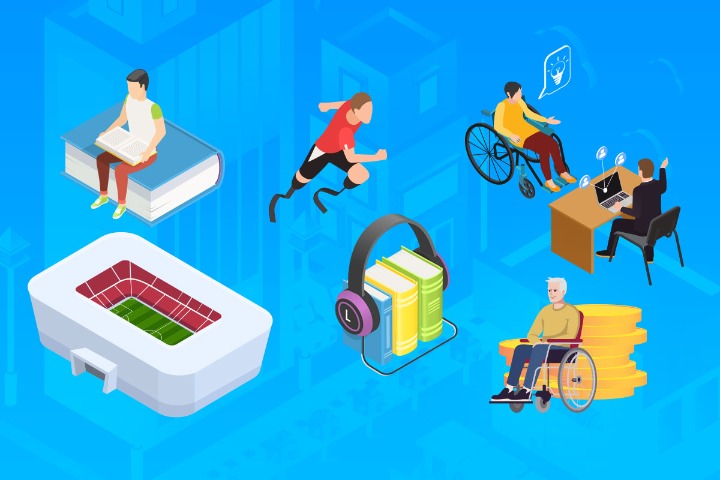Zhang Haidi: Provide services and protection for people with disabilities within normalized pandemic prevention and control

Zhang Haidi, a member of the Standing Committee of the National Committee of the Chinese People's Political Consultative Conference and chairwoman of the China Disabled Persons' Federation (CDPF), suggested that the rights and interests of people with disabilities should be protected in four areas: improving public health laws and regulations, providing easy access to information, providing effective services, and enhancing theirself-protection and health management capabilities.
Firstly, people with disabilities should be respected and protected. She recommends that governments at all levels, when improving public health legislation and formulating emergency plans for public health emergencies, should prioritize the protection of people with disabilities, children and the elderly, and ensure that people with severe disabilities, families of persons with special difficulties, and units where people with disabilities are concentrated receive timely support and assistance.
Secondly, it is important to ensure that information is accessible to people with disabilities. Press conferences and television networks should add subtitles to public health emergency announcements and, as far as possible, sign language. Hospitals and centralized isolation sites are required to install audio and captioning devices to provide information.
Thirdly, when establishing emergency centers, special access points for people with disabilities should be established and equipped with sign language interpreters, rehabilitation professionals, psychological guidance professionals and volunteers, as well as materials such as assistive devices, hygiene products and medicines that are often used by people with disabilities so as to provide effective services for them.
Fourthly, all kinds of emergency care books should include information for people with disabilities and their relatives and care-givers to enhance their capacity for self-protection and health management.
In addition to epidemic prevention and control, Zhang also suggested how to protect the rights of persons with disabilities in other emergency situations.
Firstly, the legal protection of emergency risk avoidance services for the disabled should be guaranteed. The relevant departments are currently working on amending the Emergency Response Act, the Construction Act, the Telecommunications Act, the Earthquake Prevention and Mitigation Act and other laws; it is proposed that the requirements for emergency evacuation, prevention and protection and barrier-free environment construction for people with disabilities and other groups be clarified.
Meanwhile,it’s necessary to ensure that people with disabilities have timely access to information pertaining to early warnings of and relief from natural disasters.
She suggested that the construction of emergency shelter facilities and barrier-free public places should be strengthened.
The level of emergency risk avoidance services and assistance for people with disabilities should be raised. Emergency relief teams should be trained to enhance their awareness of accessibility and their ability to assist; emergency evacuation drills for people with disabilities should be conducted and emergency evacuation needs of people with mental and intellectual disabilities and other groups should be studied with a view to establishing a special support system; and various safety education books should be prepared to enhance the public's crisis awareness and ability to assist people with disabilities in disasters or emergencies, according to Zhang.
In order to alleviate poverty among poor people with disabilities,the CDPF has strengthened data sharing and comparative analysis with relevant departments such as public security, civil affairs, poverty alleviation, education and human resources and social security.
The CDPF has made use of the application “Map of Services for Persons with Disabilities in the Fight against Poverty” to check the national distribution of registered people with disabilities who have not yet been lifted out of poverty, and to accurately grasp information on the barrier-free adaptation of homes for people with severe disabilities, children who have not yet enrolled in school, and those in need of care, so as to promote barrier-free adaptation and rehabilitation services for all.
The application of big data and geographic information technology to promote services for people with disabilities ensures basic livelihoods for those living in poverty and provides strong data support for accurate policy-making.
In the next phase, the CDPF will use the internet,big data, artificial intelligence and other technical means to strengthen the scientific research and analysis of big data, and expand"internet plus" services for the disabled.
The CDPF aims to promote deep integration of big data and the cause of people with disabilities, and to provide services and protection in an orderly manner in the context of normalized pandemic prevention and control.




